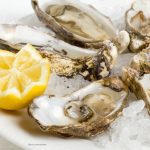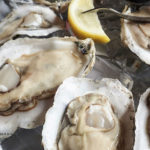A large oyster norovirus outbreak has sickened at least 328 people in Canada as of April 8, 2022 (and at least 103 in the United States). Raw and undercooked oysters can contain pathogens such as norovirus that can make you sick. The patient case count by province is: British Columbia (293), Alberta (3), Saskatchewan (1), Manitoba (15), and Ontario (16). Illness onset dates range fro mid-January and early April 2022. Not all cases hav been tested, but the presence of norovirus has been confirmed based on the tests of several patients. The outbreak is linked to consumption of raw oysters from British Columbia. Some oyster harvest areas in British Columbia associated with this outbreak have been closed as a part of this investigation. Several food recalls have been issued in … [Read more...]
FDA: Do Not Sell or Serve Norovirus Raw Oysters From Canada
The FDA is advising retailers and restaurants not to serve or sell norovirus raw oysters imported from Canada. There is a large norovirus outback in Canada associated with those oysters, and there are also norovirus outbreaks in Minnesota, California, and Washington state. The FDA, CDC, and the Public Health Agency of Canada are investigating a multi-state outbreak of norovirus linked to raw oysters. The potentially contaminated raw oysters that were harvested in the south and central parts of Baynes Sound in British Columbia were distributed to restaurants and retailers in California, Colorado, Florida, Hawaii, Illinois, Massachusetts, Minnesota, New Jersey, Nevada, New York, Oregon, Texas, and Washington. More states may have received these oysters. A trace forward … [Read more...]
Minnesota Oyster Norovirus Outbreak Sickens 29
A Minnesota oyster norovirus outbreak has sickened at least 29 people, according to the Minnesota Department of Health. The raw oysters were harvested from a specific bay in British Columbia, Canada, and were served at Travail Kitchen in Robbinsdale on March 20, 2022. The Minnesota Department of Health, Hennepin County Public Health, and the Minnesota Department of Agriculture are working with federal officials and public health agencies in other states and Canada to investigate norovirus illnesses that are associated with oysters harvested from Bay 14-8 in British Columbia. Those sickened in Minnesota became ill with confirmed or suspected norovirus gastroenteritis after eating the oysters at Travail Kitchen. The oysters served were Stellar Bay Gold oysters harvested on March … [Read more...]
Oysters Recalled For Norovirus in Canada as Outbreak Monitored
Oysters recalled for norovirus in Canada are being named as an outbreak is monitored. There are currently three recalls for raw oysters on the Canadian Food Inspection Agency (CFIA) website. Illnesses are associated with all of these oysters, according to the CFIA. The first recall is for some Stellar Bay Shellfish Chef Creek Oysters. Those oysters were sold in British Columbia and may also have been sold in other territories and provinces. The recalled item is Stellar Bay Shellfish Oyster, Chef Creek, sold in variable, or clerk-served packages. You can see the Harvest Date and lot numbers at the CFIA site. This recall was an update to an earlier recall with more products, including Stellar Bay Gold, Large Oyster Kusshi, and Kusshi Oysters. Those three types of oysters were sold in … [Read more...]
Potters Pond Campylobacter Outbreak in Rhode Island Sickens Seven
A Potters Pond Campylobacter outbreak has closed the area, which is used for shellfish harvesting, in Rhode Island after seven people got sick with the bacterial infection, according to the Rhode Island Department of Environmental Management and the Rhode Island Department of Health (RIDOH). Potters Pond is located in South Kingston, Rhode Island. The pond is going to remain closed until further notice. An investigation linked the illnesses to shellfish harvested in the area. A shellfish sample collected by RIDOH tested positive for Campylobacter Iari. The shellfish sample doses not match the illnesses from the investigation, however, the positive shellfish sample does indicate the presence of Campylobacter in the pond. More samples are being collected and tested. Two of the … [Read more...]
How Do You Know If You Have a Vibrio Parahaemolyticus Infection?
How do you know if you have a Vibrio parahaemolyticus infection? This illness is caused by a type of bacteria that grows in marine water and can grow in shellfish. The pathogen causes an illness called vibriosis. Vibrio bacteria are found naturally in marine coastal waters, in saltwater, and in rivers and streams where freshwater meets saltwater. It is usually present in levels that are low enough to cause no problems, but it grows and multiples rapidly when water temperatures are high. Most vibrio illnesses and outbreaks occur in the summer months. Most cases of vibriosis are caused by eating raw and undercooked shellfish. Even fully cooked seafood can be recontaminated if rinsed with seawater after cooking. Other issues that can cause rapid bacteria growth include not keeping … [Read more...]
Washington Vibrio Outbreak Linked to Oysters From Samish Bay
A Washington Vibrio parahaemolyticus outbreak has sickened multiple people, according to the Washington State Department of Health. The outbreak is linked to oysters harvested in Samish Bay. The notice posted in the Shellfish Safety Map alert page says that there are multiple confirmed Vibrio illnesses. That bay is now closed to oyster harvesting. The closure period is for 21 days, but the closure may be extended if environmental test results of thermostable direct hemolysin (TDH) and TDH-related hemolysin (TRH) levels are in excess of 10 MPN/gram. The closure notice was posted on July 16, 2021. No one can harvest oysters in that Bay for the next 21 days, or when officials lift the closure. The number of cases "has already surpassed the highest number of cases ever recorded by … [Read more...]
Avoid Making and Serving These Potentially Dangerous Holiday Foods
Every year people are sickened by certain types of foods. Avoid making and serving these potentially dangerous holiday foods this season. Some are inherently dangerous, and others are easily contaminated with dangerous bacteria. The potentially harmful foods include cannibal sandwiches, raw cookie dough, eggnog, unpasteurized cider, and raw oysters. Cannibal sandwiches are sandwiches made with raw ground beef. They are a specialty in some areas of the Midwest United States. In 2013, an E. coli O157:H7 outbreak in Wisconsin was associated with the seasonal consumption of these sandwiches. Raw ground beef is inherently risky, because cows carry pathogenic STEC bacteria in their guts. When the cows are slaughtered, the bacteria are released and can contaminate the beef. When this beef … [Read more...]
Raw Oysters Recalled in Canada For Possible Norovirus Contamination
Several brands of raw oysters have been recalled in Canada for possible norovirus contamination. Norovirus causes gastrointestinal illness that is often called the stomach flu. The first recall, of Union Bay Seafood raw oysters, was triggered by an investigation into a foodborne illness outbreak. Illnesses have been reported in association with the consumption of these oysters. Union Bay Seafood is recalling Pacific Oysters for possible norovirus. The recalled products include Pacific Oysters, Chef Creek Xsm, sold in 5 dozen lots. There is no UPC number on the product. The codes on the recalled oysters are: Harvest location: BC 14-8 Landfile: 1402060 Lot: W20200211 Harvest date: 10 Feb. 2020. Also recalled are Pacific Oysters, Cascade Xsm in 5 dozen lots. The codes on that … [Read more...]
Tomales Bay Oyster Norovirus Outbreak Sickens 44 in California
The California Department of Public Health has closed Tomales Bay to oyster harvesting because a norovirus outbreak that has sickened at least 44 people is associated with oysters from that area. The CDPH posted a recall and listed 40 restaurants that may have sold the Hog Island oysters. The restaurants are located in San Francisco, Sonoma, Petaluma, Bolinas, Sacramento, Sebastopol, Napa, and Santa Rosa. The closure was issued on January 3, 2019, according to Dr. Matt Willis, Marin County's public health officer. The state of California has recalled Tomales Bay oysters that were served in 34 restaurants by Hog Island Oyster Company. The illnesses happened between December 29, 2018 and January 5, 2019. The illnesses were in San Francisco. Public health officials interviewed … [Read more...]








